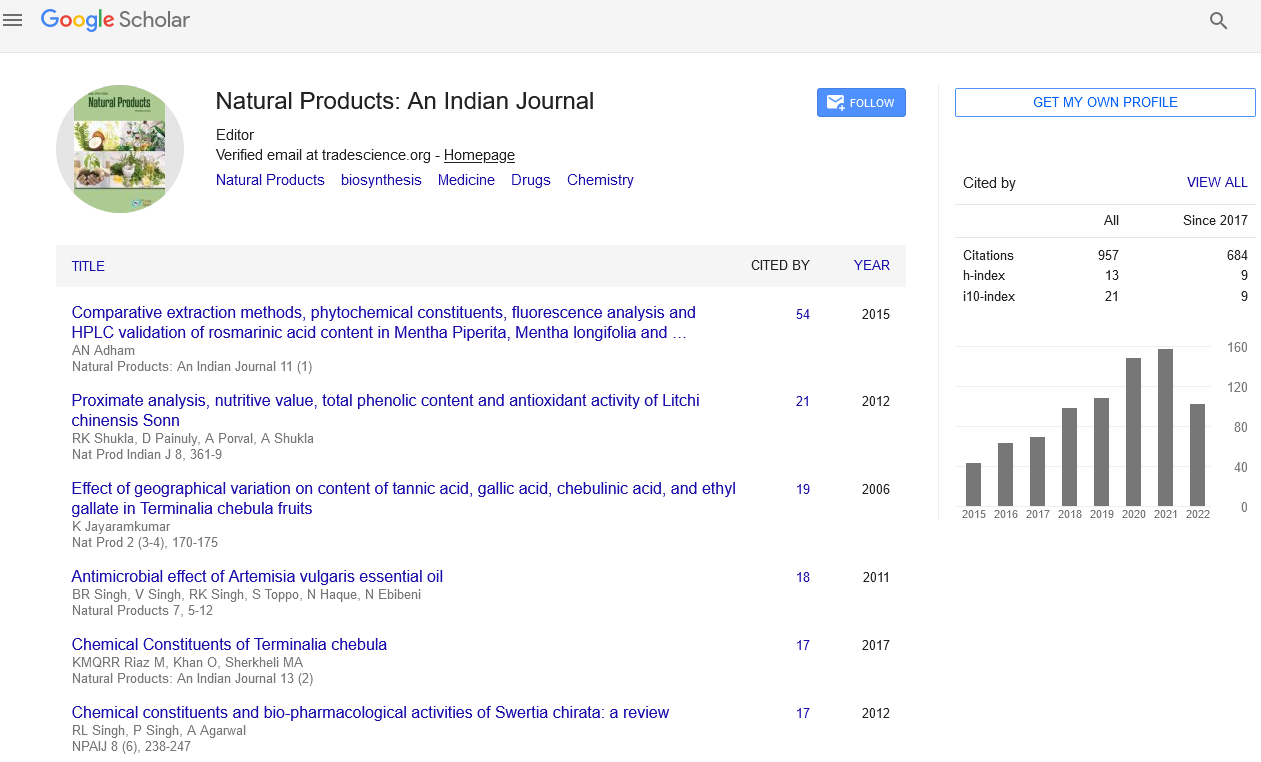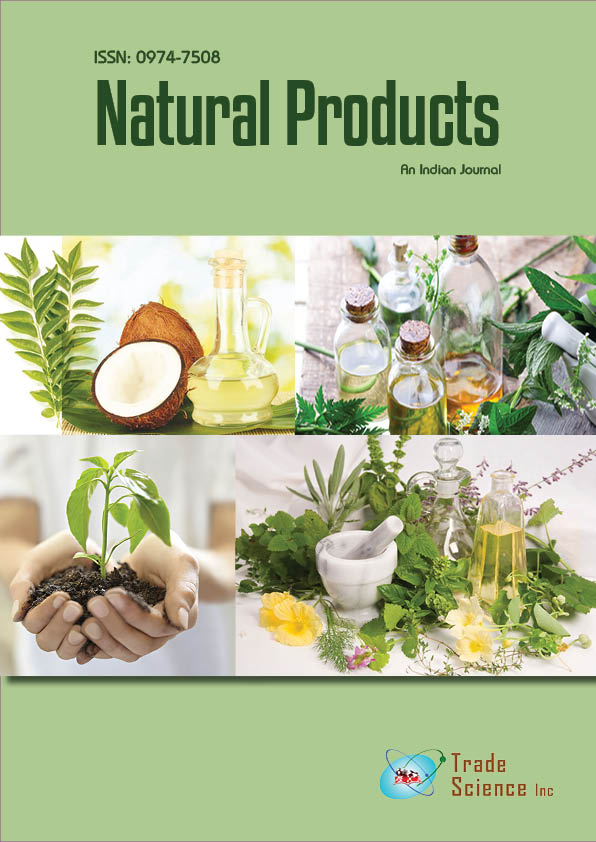Short commentary
, Volume: 14( 2)Perspectives for Ticks Control through Natural Products Use
- *Correspondence:
- Freitas DRJ, Federal University of Piauí, Department of Parasitology and Microbiology, Brazil
Tel: +5508632156558;
E-Mail: danielarjfreitas@ufpi.edu.br
Received: September 27, 2018; Accepted: October 9, 2018; Published: October 16, 2018
Citation: Freitas DRJ. Perspectives for Ticks Control through Natural Products Use. Nat Prod Ind J. 2018;14(2):122.
Abstract
This article approaches the problems regarding ticks worldwide and their current control perspectives through natural products.
Keywords
Tick control; Resistance; Natural pesticide; Animal and human health; Eco-sustainability
Ticks are ectoparasites that feed with host’s blood and can easily adapt to hosts and the environment, accordingly with their species. Ticks can transmit various diseases, such as, Borrelia burgdorferi spirochete transmitted by Ixodes ricinus causing Lyme disease. This has effected humans with a large number of cases in the American continent and worldwide. Other species, in Rhipicephalus genus for example, can cause a large economic impact at the agricultural scenario, reducing productive and reproductive herd´s performance causing animal leader quality reduction, milk production loss, outstanding costs with the parasite control and possible pathogen transmission, such as protozoa from Babesia genus and rickettsia from Anaplasma genus. An infinity of other ticks’ species can transmit various diseases for wild animals, and eventually domestic animals and humans.
Currently, ticks control is basically chemical control through synthetic molecules. However, this has provided a progressive increase at the number of ticks’ resistance to main acaricides and consequently the necessity of increasing the acaricides frequency of use. On the other hand, this fact leads to three major problems: environmental contamination, fast development of germicide resistance and germicide residue at animal products (meat and milk) in farm animals case, which has preoccupied the society and government agencies worldwide. At this perspective, it´s important to prevent the use of synthetic chemical for acaricides and adopt ecologic friendly alternatives that cause less damage to the environment and can still control ticks. Plants are an important substance source with different chemical structure and various activities against arthropods, which promotes the development of new control practices researches, such as, the use of medicines based on plant extracts [1-4].
Recent studies demonstrate acaricides activity on essential oil extract from plants. Essential oils are a mixture of volatile secondary metabolites extracted mostly from hydrodistillation of different plant parts, from leaves, fruit, seed to roots. It´s main chemical composition is terpenoids or isoprenoids, an over 40,000 substances family. A study with a Brazilian native plant essential oil Baccharis dracunculifolia DC (Asteraceae) (commonly “alecrim do campo”) presented high acaricides activity (over 90%) in larvae and in adult females of Rhipicephalus B. microplus. Other studies performed with high tannins showed that their extract has larvicidal activity and also affect the reproduction of adult R. microplus females.
It has also been demonstrated that synthesized nanoparticles (NPs) are less prone to cause ecological damage and were identified as a substitute to chemical synthetic insecticide, so can be used for the vector control of diseases. A study has used aqueous extract of Momordica charantia Linn leaves (Cucurbitaceae), tropical areas plant (India, China, Japan, Oriental Africa and Souh America), for ZnO NPs production, used in blood parasites control, such as R. microplus, with excellent and eco-friendly results (Gandhi et al.). In South Africa it was performed a recent study using 13 plant species ethanolic and acetonic extracts for controlling blue-African tick Rhipicephalus (Boophilus) decoloratus, African and Asian common specie. Two species were very promising and their extracts killed 80% to 82% of the tested tick population.
The results discussed here, however, are not new but can be dated from the 90´s to present. They demonstrate various efficacies, accordantly the plant species, tested compost type and used concentrations. The tick genus broadly used at this type of experiments are Rhipicephalus (Boophilus), Amblyomma, Dermacentor, Hyalomma and Argas. Frequently, the main plant species belong to Lamiaceae, Fabaceae, Asteraceae, Piperaceae, Verbenaceae and Poaceae family. Different secondary metabolites present at vegetal extract are the best alternative to susceptive tick or commercial acaricides resistant control [5-7].
Indeed, the search for natural products, eco-friendly with low animal and human toxicity and low economic cost is increasing worldwide, with great perspective for its use to become a reality. After all, in a limited resources planet, large scale chemical contamination and increasing human population, choose to reduce environmental pollution and reduce the synthetic chemical products is a matter of survival.
Acknowledgment
We would like to thank Federal University of Piauí for the financial support of our researches regarding plant extract use on vector control of diseases, parasites and microbial agents.
References
- Rosado-Aguilar JA, Arjona-Cambranes K, Torres-Acosta JFJ, et al. Plant products and secondary metabolites with acaricide activity against ticks. Vet Parasitol. 2017;238:66-76.
- Fouche G, Ramafuthula M, Maselela V, et al. Acaricidal activity of the organic extracts of thirteen South African plants against Rhipicephalus (Boophilus) decoloratus (Acari: Ixodidae). Vet Parasitol. 2016;224:39-43.
- Salas AF, Alonso-Díaz MA, Acosta-Rodríguez R, et al. In vitro acaricidal effect of tannin-rich plants against the cattle tick Rhipicephalus (Boophilus) microplus (Acari: Ixodidae). Vet Parasitol. 2011;175(1-2):113-8.
- Gandhi PR, Jayaseelan C, Mary RR, et al. Acaricidal, pediculicidal and larvicidal activity of synthesized ZnO nanoparticles using Momordica charantia leaf extract against blood feeding parasites. Exp Parasitol. 2017; 181:47-56.
- de Assis Lage TC, Montanari RM, Fernandes SA, et al. Chemical composition and acaricidal activity of the essential oil of Baccharis dracunculifolia De Candole (1836) and its constituents nerolidol and limonene on larvae and engorged females of Rhipicephalus microplus (Acari: Ixodidae). Exp Parasitol. 2015;148:24-9.
- Moraes J, Arreola R, Cabrera N, et al. Structural and biochemical characterization of a recombinant triosephosphate isomerase from Rhipicephalus (Boophilus) microplus. Insect Biochem Mol Biol. 2011;41(6):400-9.
- Connally NP, Rose DA, Breuner NE, et al. Impact of wearing and washing/drying of permethrin-treated clothing on their contact irritancy and toxicity for nymphal Ixodes scapularis (Acari: Ixodidae) Ticks. J Med Entomol. 2018;1-15.

